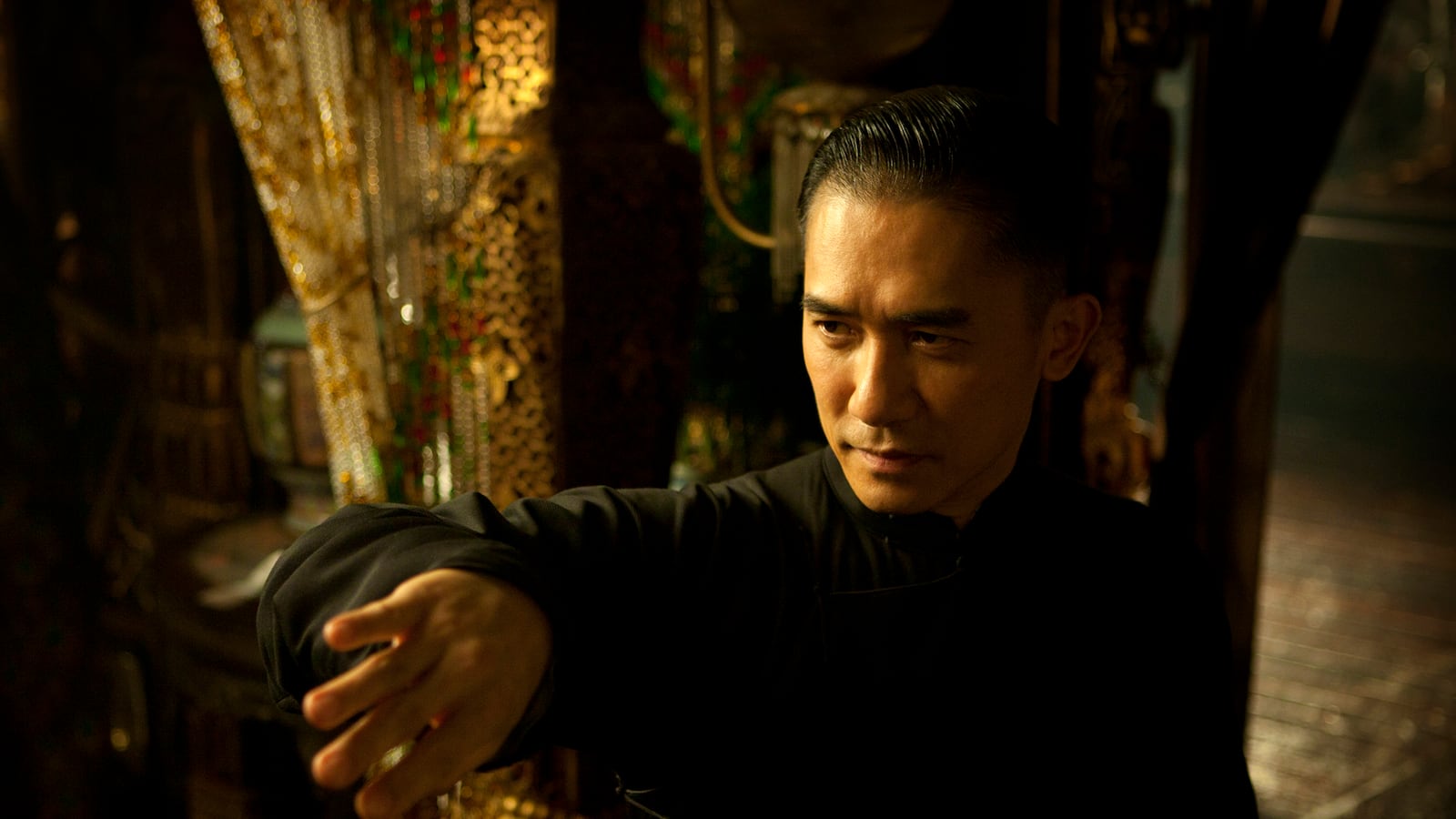There’s something calming about Tony Leung. The 51-year-old Hong Kong superstar sits on a white leather couch at the ritzy SLS Hotel in Beverly Hills, his usually side-parted hair now shaved down to a buzz cut. Despite a hectic schedule promoting The Grandmaster, an arthouse biopic based on the legendary kung fu master Ip Man out in select theaters Friday, he seems at ease. It’s as if he has adopted the Zen qualities associated with martial artists.

“It’s not easy for someone like me to start learning kung fu at the age of 47,” a soft spoken Leung tells The Daily Beast.
He went through four years of vigorous training with the masters of Wing Chun martial arts for the role. Along the way, he broke his arm twice. In his seventh film with auteur director Wong Kar Wai, Leung and his costars Ziyi Zhang and Chang Chen (both in Crouching Tiger, Hidden Dragon) had to achieve a high level of authenticity in mastering the moves and embodying the spirit of kung fu during their three years of filming. Physical conditions were rough during the shoot, as they spent months in the freezing, snow-blanketed landscapes in Northeast China. They even shot for 30 successive nights in cold and wet clothing to capture the epic opening fight sequence in the rain.
Leung isn’t a stranger to playing challenging roles. He snagged the best actor award at the 2000 Cannes Film Festival for In the Mood for Love. In director Ang Lee’s Lust, Caution, which won the coveted Golden Lion award at the 2007 Venice Film Festival, Leung portrayed a menacing Mr. Yee whose graphic sex scenes in the film earned it an NC-17 rating. It was something he never thought he’d be able to do.
“Somehow, someone can open up your mind,” Leung says. “We spent a lot of time talking, building up trust little by little. [Lee]’s very intellectual. He knows how to open up the actor’s mind and explore.”
Even though The Grandmaster is Wong’s first kung fu movie, it’s a classic Wong film. It’s poetic and the characters repress their romantic notions. It spans the 1930s to the 1950s, during the golden era of Chinese martial arts and the tumultuous period when the Japanese invaded China. Ip Man, a wealthy native of Southern China and master of Wing Chun, is met with challenges from grandmasters at every corner, including Gong Er (Zhang)—an expert in the Bagua-style. She’s also a woman who catches his eye.
Ip Man suffers heartbreaking losses in the war, and the heyday of kung fu grandmasters is long gone. Exiled, he goes to Hong Kong and spreads Wing Chun to students—one of his most famous disciples being Bruce Lee.
In fact, this version of Ip Man is a lot like Bruce Lee. When Leung took on his role, he had to revisit Lee’s films and books, but was still unsure on how to create his character. “You cannot learn the spiritual side of kung fu in just reading two books,” he says.
Although Leung idolized Lee at a young age—even calling him “a god”—his parents wouldn’t let him study martial arts because they saw it purely as a physical activity only for policemen or gangsters. Through his experience with The Grandmaster, Leung discovered the depth of the revered practice. Once Leung learned the basic moves of Wing Chun, he studied the spiritual side of it, which the film captures in its Taoist and Zen-rooted, philosophical screenplay.
Ip Man is different from the previous roles Leung has had in Wong’s films. His characters were “sad, suppressed, and dark.” Ip Man has an air of optimism and positivity that Leung hasn’t experienced in recent roles, and it has changed the way he even approaches his life. “I try to put what I learned in kung fu in real life: how to deal with the team, how to deal with life, and how to deal when I encounter difficulties and bad times,” Leung says. “This process was not just a movie—it’s a great experience and an inspiring journey.”
While Wong’s directing style normally keeps Leung in the dark on his roles and the plot, Leung says this was the first time he felt confident on set in understanding his character. The lengthy amount of time Wong uses to shoot his films allows his actors to slowly experience life through their character’s eyes and transform into them. When Leung agreed to take on the role, he had no idea that it would take four years to finish, nor did he care. “If you have a chance to work with a dream team and someone you trust and a lot of talented people, it’s fun,” Leung says.
“I’ve been working as an actor for 30 years, so four years is no big deal,” he says. “Who can afford to spend that much time for you to do a character, for you to go that deep, to experience the life of a grandmaster? I don’t think there are many directors who can afford that.”
Hollywood directors have sought after Leung, but he hasn’t found a role he’s interested in yet. He isn’t exactly looking to break into American cinema.
“I don’t need to be more famous,” he says. “I just enjoy doing movies. And that’s it.”






